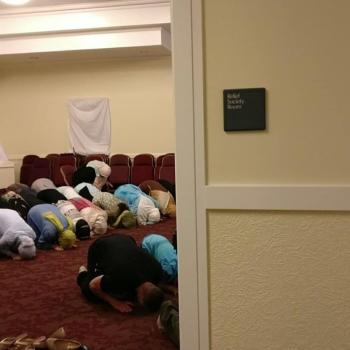
(Wikimedia Commons public domain image)
In fits and starts, I occcasionally work on revising my old Abraham Divided book — an introduction to the Arabs and Islam aimed principally at Latter-day Saints — for republication, probably under a different title (it will be a substantial revision, certainly in the last two chapters) rather than as a third edition.
Here’s an example of the kind of thing that I now need to take into account, but which wasn’t really on my radar screen back when I wrote the first edition:
Joel J. Miller began mounting an interesting theological challenge to Islam several years ago. I posted a link back then to his article “Islam is a religion of violence: Or, why abstract theology actually matters,” indicating that I disagreed with him at some crucial points.
Later, he published an article entitled “The existential crisis behind today’s Islamic violence”:
http://blogs.ancientfaith.com/joeljmiller/islamic-violence/
As I say, I find his challenge interesting and important. And I mean that. But I don’t think he’s right. I think that what he says deserves reply.
I think I’ll need to respond to him — or, more accurately, to the kinds of ideas that he’s advocating — in some detail, either in my revised book or perhaps elsewhere. But, without elaborating on them, here are some places where I would challenge him:
1. It isn’t true that Islamic theology “drove conquest” “from Day One.” For the first ten years of the existence of Islam, Muslims were persecuted. And, thereafter, they were under military attack for most of the rest of Muhammad’s life.
2. It seems simplistic to assume that Islam lacks a deep concept of love because it isn’t Trinitarian. Judaism isn’t Trinitarian, either. And Christianity itself — think of the Crusades, think of European colonialism and the slave trade, think of the Spanish Reconquista and the Inquisition, think of Slobodan Milošević (how ironic that Joel Miller relies so heavily upon the anti-Muslim sentiments of, of all things, a Serbian writer!), think of innumerable other examples — hasn’t always exhibited divine love especially well.
3. The claim that “Islam began as a Christian heresy” is dubious, at best. Dante thought so, but he had the excuse of being an under-informed medieval Catholic. Mr. Miller should know better before he applies fingers to computer keyboard
These sorts of notions merit a response. I’ll address them, at least in passing, in my book. (They’ve been added to my checklist.)












